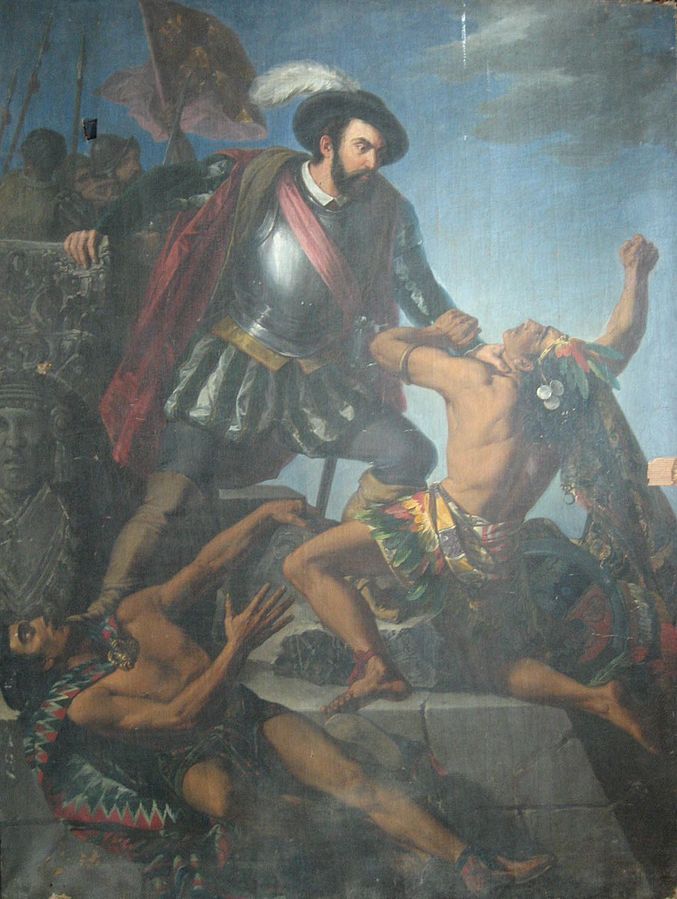|
Català: Hernan Cortés lluita amb dos indis by Antoni Gómez i Cros (1809–1863) Two new poems by Ivan Argüelles Historia Verdadera de la Conquista great cadavers of heat circulating like unspoken romance dialects in the ivy & to sleep in summer’s ornate diphthong yielding to the profound ampersand woven into the nexus of eyelid and sight – why go on piercing darkness with Toltec lightning riding cordilleras that differ from Spanish or Sanskrit as much as distance diverges from the porphyry of longing ? inversions of the horse and swart perspiration armor soldered to glistening herculean frames and the flotilla of imported hills charging surf the whiteness of the outer rim the deep indigo that is fatal to the eye the immensities of cobalt even as its avenues sprawl into nopal underbrush flowers fired from archaic muskets like troops of cloud-elephants prepared to seize the continent blinding whatever passes for light in the gloaming boomerang and volcano and ninety-degree alcohol when skies did battle with skies ! the ungovernable envelope of siglo de oro with its plethora of misdirected synonyms shepherds and avatars of lazar-house gods the unique digit that transforms sound into space echo after echo of an unheard Basque consonant ready to detonate the lacerated backside of Cuba the life of the ear and its golden assonance in the rushing welter of oceans on the other side of the perforated and pearly Lobe ringing syllabic disunities in rock and moss mufti and corduroy of the managerial knees sequences of traffic racing the invisible storms of Tampico where gun-runners and affidavits of bright toxicity lounge half-drunk in the ravaged tropical greenery saliva and boredom of the new ruling class borrowed gypsum thoughts heaving mountain-peaks dialects of Chapultepec childhoods the works hobbling with Franciscan mountebanks from the Old Country gringo hospice dereliction of the Carretera Panamericana where it is always the summer of 1953 BCE when the twins besieged the Popol Vuh motel ransacking dust and brick the bath of fame inches within the insect who bears History on its carapace and corn fields planted with munitions and the unending Communist Revolution of Cuauhtémoc the motor buried deep in Xochimilco floral beds water follows water into the reverse of the leaf whose exhausting idiom divides night into the multiple hemispheres of Oblivion 10-14-20 LAS AZOTEAS DE TENOCHTITLÁN half way through time in the center of space all directions go from the meridian straight north avoiding south where the dead thrive on monosyllables and the third hemisphere of time is shortened by the inch of light it takes to cross sleep’s boundaries mortals puzzle over birth and etymologies the eye’s memories are a confused reticulation a brief phase in eternity’s unfinished ant-hill dark labyrinth of coagulated stars and waters spectral resonance of the unfinished noon of marble when nothing moves but an incremental shimmer glare and intimation of a sun too soon blackened by coruscating elements of an aggravated city traffic of bacchants and hieroglyphs totem Spaniards who have left behind Galatea and her phantom shepherds for the colossal gold bricks and unstemmed tide of silver for the canals of sacred sewage Aztec immolated stone the top and pinnacle of a single multicolored plume signaling the end to the first day of a tropical infinity bulwark of crescent shaped frogs hidden in San Ángel the possibility that a new year might begin at last frame of water shivering Toltec vowels embossed in a mental armor the blaze and rutilation of horses climbing bone masses and the bruited nonsense of cadavers by the thousands left to be counted by augurs who imitate almanacs and friezes depicting enormous Revolutionary symphonies memory of children left to dry on rooftops with bleached linens sacrosanct rags panoply of rust and sugar skulls deaths by the hundreds with tiny horns blowing hats and wings terrific parades of cinematic automobiles Dolores del Rio the saint who ate the pyramids the offal of transgression mimics and sinners liars at the wheel Porfirio Díaz fading in the photograph of the Volcano and its slattern wives gesture of a phonetic pistolero to gain his daily share bread divided into fractions of oxygen and kneeless penitents of Guanajuato looking for the Surgeon of Nayarit who will soon be knocking at the door flummoxed and insensate with pulque the famous red margin of the Hours draping the pharmacy windows and the blow-out of night furious and intellectual the dialectic of darkness smoke and unending neologisms about the Life eternal to be sought somewhere in El Norte fiction of Hollywood countless abandoned motors and skins the frontera where the scales of justice tilt gagging on days-old urine cycles of pathos and iceberg lettuce spine chilling dreams recollecting the azoteas de Tenochtitlán Chabela and her amazing ink-spent hair the wind that takes its ropes and ties them around the Cathedral lifting from earth the archaic architecture of oblivion while worms with the mistaken eyes of devastated gods who live on cigarettes and cerveza in cantinas of peeling wallpaper and fly-swatters create words circular and soundless echoes tinny subtractions discarded illegible typescript on onion skin History 10-19-20  Ivan Argüelles is an American innovative poet whose work moves from early Beat and surrealist-influenced forms to later epic-length poems. He received the Poetry Society of America’s William Carlos Williams Award in 1989 as well as the Before Columbus Foundation’s American Book Award in 2010. In 2013, Argüelles received the Before Columbus Foundation’s Lifetime Achievement Award. For Argüelles the turning point came with his discovery of the poetry of Philip Lamantia. Argüelles writes, “Lamantia’s mad, Beat-tinged American idiom surrealism had a very strong impact on me. Both intellectual and uninhibited, this was the dose for me.” While Argüelles’s early writings were rooted in neo-Beat bohemianism, surrealism, and Chicano culture, in the nineties he developed longer, epic-length forms rooted in Pound’s Cantos and Joyce’s Finnegans Wake. He eventually returned, after the first decade of the new millennium, to shorter, often elegiac works exemplary of Romantic Modernism. Ars Poetica is a sequence of exquisitely-honed short poems that range widely, though many mourn the death of the poet’s celebrated brother, José.
0 Comments
Your comment will be posted after it is approved.
Leave a Reply. |
Archives
July 2024
Categories
All
|
Donate and Make Literature Happen
is published by the Somos En Escrito Literary Foundation,
a 501 (c) (3) non-profit, tax-exempt corporation. EIN 81-3162209



 RSS Feed
RSS Feed